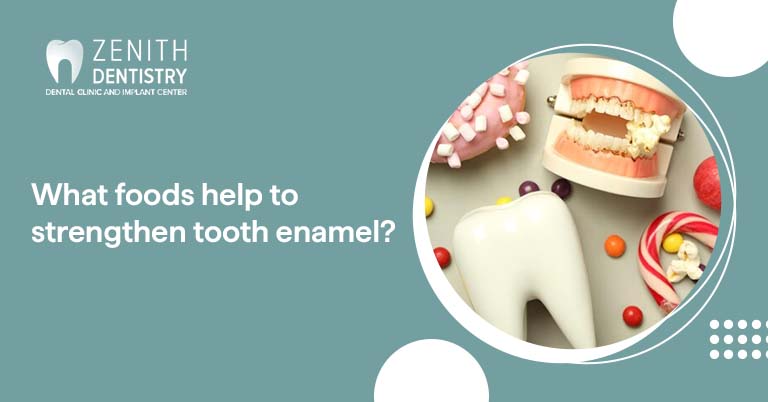
What foods help to strengthen tooth enamel?
What you eat matters more than you might think in the pursuit of a healthy, vibrant smile. Tooth enamel, your teeth’s protective outer layer, is remarkably resilient, but it can still be damaged by certain dietary choices.
Our blog will reveal both the common foods that can harm your tooth enamel and protect your teeth enamel. You can take a proactive step toward preserving your dental health and ensuring that your smile.
What is tooth enamel?
The outermost coating of a tooth, enamel, protects the underlying dentin and pulp. It is one of the toughest substances in the human body and is made of hydroxyapatite, a mineralized structure rich in calcium and phosphate. It is highly resistant to wear and tear yet susceptible to bacterial and acidic food erosion. Because enamel does not regenerate, good Oral Hygiene is essential for preserving its integrity.
What foods cause dental enamel damage?
Because of their acidic or sugary character, a variety of foods and beverages can contribute to tooth enamel erosion and weakening. Here are a few examples of common offenders:
1) Citrus Fruits
Oranges, lemons, limes, and grapefruits have significant levels of acid, which can weaken enamel over time.
2) Acidic beverages
Diet and routine Sodas are highly acidic and frequently contain phosphoric and citric acid, both of which can destroy enamel.
3) Fruit Juices
Many fruit drinks, such as orange juice, grape juice, and lemonade, are acidic and, if consumed frequently, can damage enamel.
4) Sour candies
Sour and chewy candies are acidic and can adhere to teeth, increasing the risk of enamel erosion.
5) Vinegars
Pickles and salad dressings made with vinegar can be acidic and potentially harm enamel if consumed in excess.
6) Sports drinks
These beverages frequently contain sugars and acids that can contribute to enamel erosion, especially if consumed on a regular basis.
7) Alcohol
Alcoholic beverages, especially wine, can be acidic and stain teeth, potentially causing enamel damage.
8) High-sugar snacks
Candies, cookies, cakes, and other sugary treats encourage the growth of harmful bacteria in the mouth, which produce acids that erode tooth enamel.
Some food suggestions for maintaining good tooth enamel
Consider the following meal suggestions to preserve healthy Tooth Enamel and protect your teeth from erosion and decay:
1) Calcium-Rich Foods
Calcium-rich foods to include in your diet include dairy products (milk, cheese, yogurt), leafy greens (kale, cabbage), and almonds. Calcium is required for robust enamel.
2) Phosphorus-Rich Foods
Phosphorus-rich foods such as lean meats, poultry, fish, eggs, and nuts can aid in the remineralization and strengthening of tooth enamel.
3) Fibrous Fruits and Vegetables
Fresh fruits and vegetables high in fiber, such as apples, carrots, and celery, can help boost saliva production. Saliva aids in acid neutralization and enamel protection.
4) Choose Sugar-Free Gum
Chewing sugar-free gum, particularly xylitol-containing gum, can stimulate saliva flow, which can aid to wash and strengthen teeth. It may help lower the likelihood of cavities.
5) Drink Water
One of the healthiest beverages for your teeth is water. It aids in the removal of food particles and acids while maintaining a neutral pH in your mouth. Fluoridated water can also help to strengthen enamel.
6) Lean Protein
To deliver phosphorus and maintain tooth health, include lean protein sources such as lean meats, poultry, fish, and tofu in your diet.
You may help keep your tooth enamel healthy and preserve strong, resilient teeth by following these food instructions and practicing basic oral hygiene.
Bottom Line
Prioritizing your dental health entails more than just brushing and flossing; it also entails making wise dietary choices. Acidic and sugary foods and beverages can gradually erode your tooth enamel, increasing your risk of cavities and sensitivity.
Limit your intake of highly acidic and sugary foods, and instead choose enamel-friendly options that promote overall oral health. Remember that a healthy diet and proper oral hygiene go hand in hand for a radiant, cavity-free smile that will last a lifetime.






